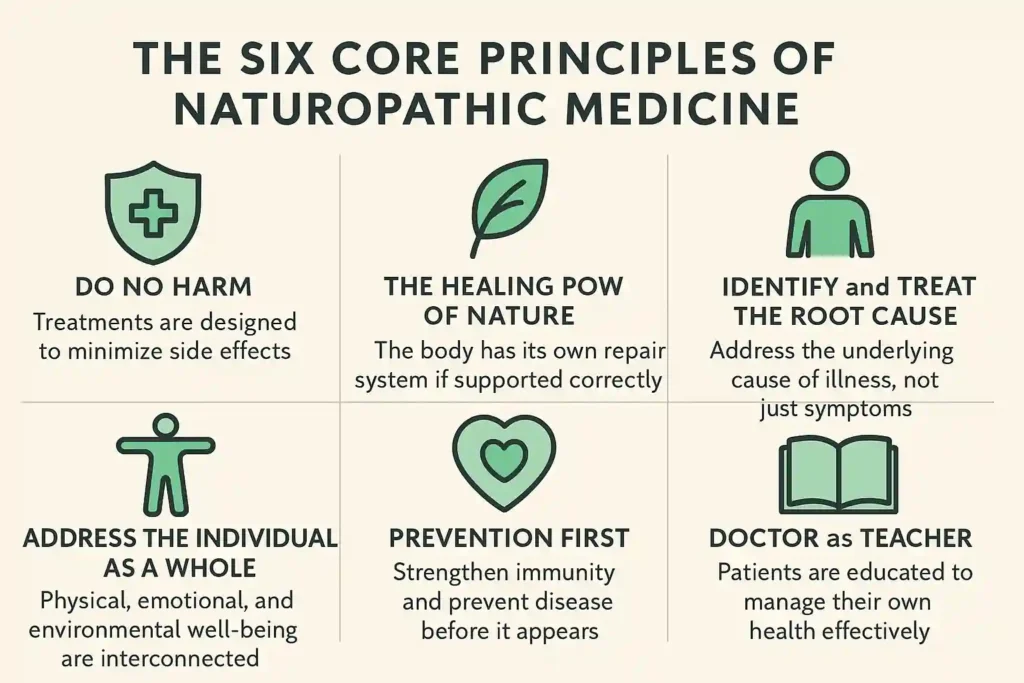Naturopathic medicine is a form of healthcare that focuses on helping the body heal itself through natural means. Rather than merely alleviating symptoms through medication, this approach examines the underlying causes of illness.
Unlike conventional care, which often focuses on a single organ or problem, naturopathy views the body as a whole system. It considers sleep, diet, stress, genetics, and even emotional health when building a plan for recovery.
People are drawn to naturopathy because it feels personal. Where standard care might last ten minutes, a naturopathic consultation may run over an hour. The patient’s story matters, not just their test results.
How Does It Work?
The naturopathic medicine definition goes beyond “natural cures.” It is based on core principles that have been passed down for centuries, but also updated with modern science.
The Six Core Principles
- Do no harm: treatments are designed to minimize side effects.
- The healing power of nature: the body has its own repair system if supported correctly.
- Identify and treat the root cause: headaches, for example, might come from stress, hormones, or posture, not just “bad luck.”
- Address the individual as a whole: physical, emotional, and environmental well-being are interconnected.
- Prevention first: it’s better to strengthen immunity than to only react when disease shows up.
- Doctor as teacher: patients are educated so they can manage their own health better.
What Treatments May Look Like
A naturopath’s plan is rarely “one-size-fits-all.” Instead, it could include:
- Herbal medicine to reduce inflammation or balance hormones.
- Lifestyle and nutrition counseling to improve digestion or energy.
- Mind–body wellness techniques such as breathing exercises or meditation.
- Natural remedies like hydrotherapy, massage, or acupuncture.
In licensed clinics, naturopaths may also use blood tests, hormone checks, and imaging to guide care. This is where naturopathy overlaps with integrative medicine and functional medicine, combining natural methods with medical science.
Who Practices It?

Practitioners in the field of naturopathic medicine are commonly known as naturopathic doctors (NDs). But not everyone with the title “naturopath” has the same background.
- Licensed NDs: Trained at accredited universities for four or more years, they study anatomy, pathology, pharmacology, and natural therapies. Some can prescribe medications, order lab work, and diagnose illnesses.
- Traditional naturopaths: May focus only on lifestyle and nutrition. Their training varies widely and may not be regulated.
This is why it’s crucial to check qualifications before starting treatment. In the U.S. and Canada, several states and provinces have strict licensing. In countries without regulation, the title “naturopath” could mean anything from a well-trained clinician to a self-taught herbalist.
A well-trained naturopath acts as both a guide and an educator, building individualized treatment plans that fit each person’s needs.
Will It Work for My Condition?
The short answer: sometimes, yes, but it depends on the condition. The real value lies in naturopathic medicine benefits for chronic, long-term, or lifestyle-related health issues.
Conditions Where Naturopathy Often Helps
- Digestive problems: Bloating, IBS, food intolerances, and acid reflux respond well to dietary changes and gut-healing herbs.
- Hormonal issues: Menstrual pain, menopause, thyroid imbalance, or fertility challenges can improve with natural support.
- Chronic fatigue: Stress reduction, sleep hygiene, and nutrient support can restore energy.
- Skin problems: Eczema, acne, and psoriasis are often tied to food and lifestyle triggers.
- Cancer support: Naturopathy may help reduce side effects from chemotherapy or radiation (always under oncologist supervision).
Where Caution Is Needed
- Emergency care: A naturopath cannot replace a surgeon or ER doctor in life-threatening cases.
- Serious infections: Antibiotics may be necessary. Herbs alone won’t cure pneumonia.
- Mental health crises: While mind-body approaches help, psychiatric care is essential for severe depression or psychosis.
The bottom line: naturopathy is not an alternative to allopathy but a complement. Many patients find the best results when both systems work together.
Keep Your Doctor in the Loop
One of the biggest risks of trying naturopathy alone is missing dangerous drug interactions. For example:
- The herb St. John’s Wort, which is used to improve mood, can lessen the effectiveness of contraceptive pills.
- Ginkgo (for memory) may thin the blood, raising bleeding risk if combined with aspirin.
This is why good naturopaths encourage patients to share every supplement and therapy with their primary physician. True integrative medicine values teamwork.
When doctors and naturopaths collaborate, patients get the best of both: life-saving interventions when needed, and long-term preventative health care strategies to avoid relapse.
Who Can Use It?
Naturopathy is versatile, but its role changes depending on age and health status:
- Children: Often benefit from gentle remedies for colds, allergies, and digestion. Parents also appreciate early lessons in healthy eating.
- Adults: Many seek naturopathy for stress, fatigue, weight, fertility, or early signs of chronic illness.
- Elderly: Naturopathy can support mobility, bone health, and safe combination with medications.
But there are limits. People with advanced heart disease, uncontrolled diabetes, or severe infections must rely on hospitals first. Naturopathy is best understood as a complementary approach, not as a substitute.
The Bottom Line
Naturopathic medicine is not about rejecting modern healthcare. It involves expanding our perspective on the healing process. By combining natural remedies, better diet, and lifestyle adjustments, naturopathy aims to support the body’s natural recovery process.
The real naturopathic medicine benefits show up when prevention and treatment come together. It doesn’t replace conventional medicine, it strengthens it.
For patients tired of quick fixes, naturopathy provides something modern healthcare often lacks: time, attention, and a focus on the whole person.
FAQs
What is an example of naturopathy treatment?
Examples include using herbal medicine for digestion, acupuncture for stress relief, and lifestyle and nutrition counseling for weight balance. These support the body’s natural healing process.
What is the difference between naturopathic and homeopathic medicine?
Naturopathy uses broad natural therapies like herbs, diet, and lifestyle changes. Homeopathy is a separate system based on very small doses of substances to trigger healing responses.
What is a naturopath diet?
It focuses on whole foods, plenty of plants, hydration, and limiting processed items. Often, naturopaths design individualized treatment plans that adjust food to match each person’s health needs.
What is another name for a naturopath?
They may be called “NDs” (naturopathic doctors), “natural health practitioners,” or “holistic doctors.” The name depends on their training and the laws in their country.
Which is better, allopathy or naturopathy?
Neither is better across the board. Allopathy shines in urgent care. Naturopathy is stronger in prevention and lifestyle-related health. Together, they offer the most complete care.
Can a naturopath prescribe medication?
In some licensed regions, yes. NDs can prescribe certain medications and order lab tests. In other areas, they may only guide with natural therapies and nutrition.
What is the difference between holistic and naturopathic?
Holistic health is a broad idea; considering body, mind, and spirit. Naturopathy is a structured medical system that applies holistic principles through natural treatments.
















Leave a Comment